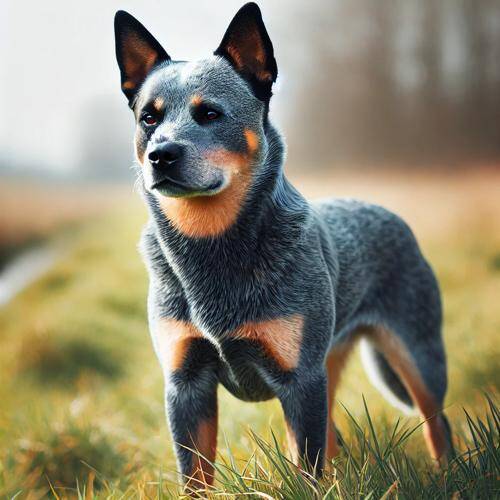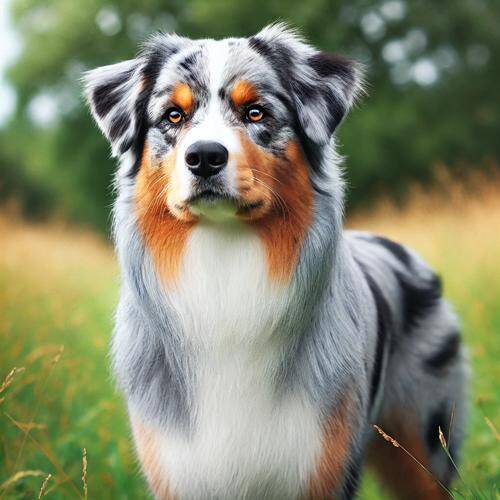
10 Dog Breeds with the Least Health Issues: Your Guide to Healthy Canine Companions
When choosing a dog, one of the key considerations is their overall health and longevity. While no breed is entirely free of health problems, some are known for their robustness and fewer health issues. Here’s a guide to a number of dog breeds that are generally healthier, making them great companions for those looking for a low-maintenance pet.
Read More: Top 15 Dog Breeds With The Highest Cancer Rates
Australian Cattle Dog

Overview: Known for their intelligence and endurance, Australian Cattle Dogs are a hardy breed with a long lifespan, often living up to 15 years or more. They are active and require regular exercise, making them ideal for families who enjoy an active lifestyle.
Health Benefits:
- Strong and Robust Build: Australian Cattle Dogs have a solid, muscular frame that contributes to their overall health and ability to avoid injuries.
- Low Incidence of Genetic Disorders: This breed has been selectively bred for working capabilities rather than appearance, resulting in fewer hereditary health problems.
- Healthy Joints and Bones: Regular physical activity keeps their joints and bones in good condition, preventing common issues like hip dysplasia.
Notable Health Aspects: These dogs are less prone to hip dysplasia and other common orthopedic issues, thanks to their active lifestyle and strong genetics. Regular exercise is crucial to maintain their physical health and prevent obesity.
Additional Insights: Australian Cattle Dogs are highly intelligent and thrive on mental stimulation. Engaging them in activities like agility training, herding, and obedience training not only keeps them physically fit but also mentally sharp. Their high energy levels make them excellent companions for hiking, running, and other outdoor activities.
Border Collie

Overview: Border Collies are highly intelligent and energetic dogs. They are known for their agility and stamina, making them excellent working dogs and loyal pets. Their herding instincts and quick learning ability make them a favorite among dog enthusiasts.
Health Benefits:
- Generally Free from Severe Hereditary Diseases: Border Collies have a robust genetic makeup, resulting in fewer inherited health issues.
- Long Lifespan (12-15 years): Their active lifestyle contributes to their longevity, ensuring many happy years with their owners.
- Excellent Physical Condition Due to High Activity Levels: Regular physical activity keeps them fit and healthy, reducing the risk of obesity and associated health problems.
Notable Health Aspects: While they are prone to certain eye conditions, regular check-ups can keep them in top shape. Their active nature contributes to their overall health, but they do require mental stimulation to prevent boredom and destructive behavior.
Additional Insights: Border Collies excel in various dog sports, including agility, flyball, and obedience competitions. Their high intelligence requires consistent training and mental challenges. Providing them with puzzle toys, training sessions, and interactive playtime helps keep their minds engaged and prevents behavioral issues.
Beagle

Overview: Beagles are small to medium-sized dogs known for their friendly nature and keen sense of smell. They are a sturdy breed with fewer genetic health problems, making them a popular choice for families and individuals alike.
Health Benefits:
- Robust Immune System: Beagles generally have a strong immune system, helping them fend off common illnesses.
- Fewer Hereditary Issues: Selective breeding has minimized the occurrence of genetic health problems in Beagles.
- Long Lifespan (12-15 years): Their sturdy build and active nature contribute to a longer life expectancy.
Notable Health Aspects: Beagles are generally healthy, though they can be prone to obesity if not properly exercised and fed a balanced diet. Regular physical activity and portion control are essential to maintain their ideal weight.
Additional Insights: Beagles are known for their excellent sense of smell and are often used in detection work, such as sniffing out contraband at airports. Their friendly and social nature makes them great companions for families with children. Providing them with regular exercise, such as walks and playtime, helps keep them healthy and happy.
Shiba Inu

Overview: Shiba Inus are a small, agile breed known for their spirited personality and fox-like appearance. They are one of the healthiest dog breeds with minimal genetic issues, making them a great choice for those looking for a low-maintenance pet.
Health Benefits:
- Strong Resistance to Common Canine Ailments: Shiba Inus have a resilient immune system that helps them stay healthy.
- Minimal Hereditary Health Problems: Selective breeding has kept genetic disorders to a minimum in this breed.
- Longevity (12-15 years): Shibas often enjoy a long and healthy life with proper care.
Notable Health Aspects: Shibas are generally free from serious health issues but require regular dental care to prevent periodontal disease. Regular brushing and professional cleanings are essential to maintain their dental health.
Additional Insights: Shiba Inus are independent and intelligent, making them a bit challenging to train but very rewarding companions. They require consistent and positive reinforcement training methods. Their natural cleanliness and grooming habits make them low-maintenance in terms of coat care. Socialization from an early age is important to ensure they develop into well-rounded adults.
Basenji

Overview: The Basenji, often referred to as the “barkless dog,” is an ancient breed known for its unique yodel-like sound and high energy levels. Their compact size and minimal health issues make them excellent pets for active families.
Health Benefits:
- Few Genetic Health Problems: Basenjis have a low incidence of hereditary diseases, thanks to their ancient lineage.
- Long Lifespan (13-14 years): Their robust health contributes to a longer life expectancy.
- Strong and Agile Build: Their lean and muscular physique helps prevent common orthopedic issues.
Notable Health Aspects: Basenjis are generally healthy but can be prone to Fanconi syndrome, a kidney disorder, which can be managed with regular vet check-ups. Early detection and treatment are crucial for managing this condition effectively.
Additional Insights: Basenjis are highly energetic and require plenty of physical activity to stay happy and healthy. They excel in activities like lure coursing and agility training. Their grooming needs are minimal, as they have a short coat and are naturally clean. Basenjis are known for their independence, so early socialization and training are essential to ensure they become well-behaved companions.
Siberian Husky

Overview: Siberian Huskies are medium-sized working dogs known for their striking appearance and friendly disposition. They are robust and have fewer health issues compared to other breeds, making them great companions for active individuals and families.
Health Benefits:
- Strong Genetic Pool: Siberian Huskies have a diverse genetic background, contributing to their overall health.
- Low Incidence of Hip Dysplasia: Their active lifestyle helps maintain healthy joints and prevent common orthopedic problems.
- Long Lifespan (12-15 years): Huskies often enjoy a long and healthy life with proper care.
Notable Health Aspects: Huskies are generally healthy but require regular exercise to maintain their physical and mental health. They are prone to certain eye conditions, such as cataracts and progressive retinal atrophy, but regular veterinary check-ups can help manage these issues.
Additional Insights: Siberian Huskies are known for their endurance and love of outdoor activities. They thrive in cold climates and enjoy activities like sledding, hiking, and running. Their friendly and social nature makes them great companions for families with children. Huskies require regular grooming to manage their thick double coat, especially during shedding season.
Chihuahua

Overview: Despite their small size, Chihuahuas are a hardy breed with a surprisingly long lifespan. They are known for their alertness and lively personality, making them great companions for individuals and families alike.
Health Benefits:
- Long Lifespan (14-16 years): Chihuahuas often enjoy a long and healthy life with proper care.
- Few Genetic Health Problems: Selective breeding has minimized the occurrence of hereditary issues in Chihuahuas.
- Generally Robust Immune System: Chihuahuas have a strong immune system, helping them stay healthy.
Notable Health Aspects: While Chihuahuas can have dental issues due to their small mouth size, regular dental care can keep them healthy. Providing them with dental chews and regular brushing helps maintain their oral health.
Additional Insights: Chihuahuas are known for their big personalities and can be quite confident despite their small size. They are highly adaptable and can live in various environments, from apartments to larger homes. Early socialization and training are important to ensure they develop into well-behaved adults. Chihuahuas are prone to obesity, so a balanced diet and regular exercise are essential to maintain their ideal weight.
English Foxhound

Overview: English Foxhounds are large, active dogs known for their endurance and hunting abilities. They are a healthy breed with minimal genetic health concerns, making them excellent companions for active individuals and families.
Health Benefits:
- Strong, Athletic Build: English Foxhounds have a robust physique that helps prevent injuries and common orthopedic issues.
- Few Hereditary Issues: Selective breeding has kept genetic disorders to a minimum in this breed.
- Long Lifespan (10-13 years): Their active lifestyle contributes to their overall health and longevity.
Notable Health Aspects: English Foxhounds are generally free from serious health problems but benefit from regular exercise to maintain their fitness. Providing them with plenty of physical activity helps prevent obesity and associated health issues.
Additional Insights: English Foxhounds are known for their friendly and social nature, making them great companions for families with children. They require regular grooming to maintain their coat, especially during shedding season. Early socialization and training are important to ensure they develop into well-behaved adults. English Foxhounds thrive in environments where they have plenty of space to run and play.
Australian Shepherd

Overview: Australian Shepherds are highly intelligent and active dogs known for their herding abilities. They are generally healthy with a robust constitution, making them excellent companions for active individuals and families.
Health Benefits:
- Long Lifespan (12-15 years): Australian Shepherds often enjoy a long and healthy life with proper care.
- Few Severe Genetic Disorders: Selective breeding has minimized the occurrence of hereditary issues in this breed.
- Excellent Physical Condition: Regular physical activity helps maintain their overall health and prevent obesity.
Notable Health Aspects: While Australian Shepherds can be prone to hip dysplasia and certain eye conditions, these issues are relatively rare and manageable with regular vet care. Early detection and treatment are crucial for managing these conditions effectively.
Additional Insights: Australian Shepherds excel in various dog sports, including agility, flyball, and obedience competitions. Their high intelligence requires consistent training and mental challenges to keep them engaged. Providing them with puzzle toys, training sessions, and interactive playtime helps prevent boredom and behavioral issues. Australian Shepherds require regular grooming to manage their double coat, especially during shedding season.
German Pinscher

Overview: German Pinschers are medium-sized dogs known for their agility and alertness. They are a robust breed with minimal health issues, making them great companions for active individuals and families.
Health Benefits:
- Few Genetic Health Problems: Selective breeding has minimized the occurrence of hereditary issues in German Pinschers.
- Long Lifespan (12-14 years): German Pinschers often enjoy a long and healthy life with proper care.
- Strong and Agile Build: Their lean and muscular physique helps prevent common orthopedic issues.
Notable Health Aspects: German Pinschers are generally healthy but require regular exercise and a balanced diet to maintain their health. Providing them with plenty of physical activity helps prevent obesity and associated health issues.
Additional Insights: German Pinschers are known for their intelligence and trainability, making them great companions for individuals and families who enjoy an active lifestyle. They excel in various dog sports, including obedience and agility competitions. Early socialization and training are important to ensure they develop into well-behaved adults. German Pinschers require regular grooming to maintain their coat, especially during shedding season.
